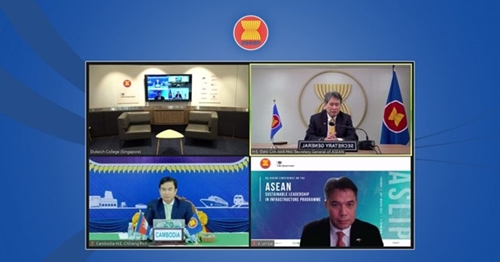More than 200 participants, including officials and representatives from ASEAN member states, the U.K., as well as other external partners and the private sector, attended the event.
    |
 |
|
The ASEAN Secretariat, the United Kingdom and the Lead Implementing Body for Sustainable Infrastructure (LIB-SI) co-organize the U.K.-ASEAN Sustainable Leadership in Infrastructure Conference online and in-person in Singapore. (Photo: asean.org) |
The conference unveiled the upcoming ASEAN Sustainable Leadership in Infrastructure Programme (ASLIP), a modular course for ASEAN officials with a focus on pre-procurement and upstream infrastructure planning. It also facilitated discussions on government-private sector collaboration in sustainable infrastructure as well as key issues on strategies and considerations in building sustainability towards net zero, urbanization, and inclusivity and social impacts.
ASEAN Secretary-General Dato Lim Jock Hoi, British Minister for Asia and Middle East Amanda Milling and Director Genera of the Cambodian Ministry of Public Works and Transport Chhieng Pich delivered opening remarks.
In his remarks, Lim emphasized the need to strengthen capacity in infrastructure planning, prioritising, delivery, operations, and management.
“ASEAN continues to focus on enhancing connectivity and promoting sustainable infrastructure to make the region more competitive, accessible, and liveable,” he said. “Achieving these goals requires us to strengthen the enabling environment for sustainable infrastructure, improve project preparation, and tap into different sources of funding, considering the unique context of each member state.”
The Master Plan on ASEAN Connectivity 2025 underscores the importance of coordinating resources to deliver support across the full lifecycle of infrastructure projects in ASEAN, which includes project preparation as well as improving infrastructure productivity and capability building.
The COVID-19 pandemic has amplified the need for capacity building on key infrastructure sectors, particularly in strengthening human resources capacity to drive sustainable infrastructure in the region.
Source: VNA